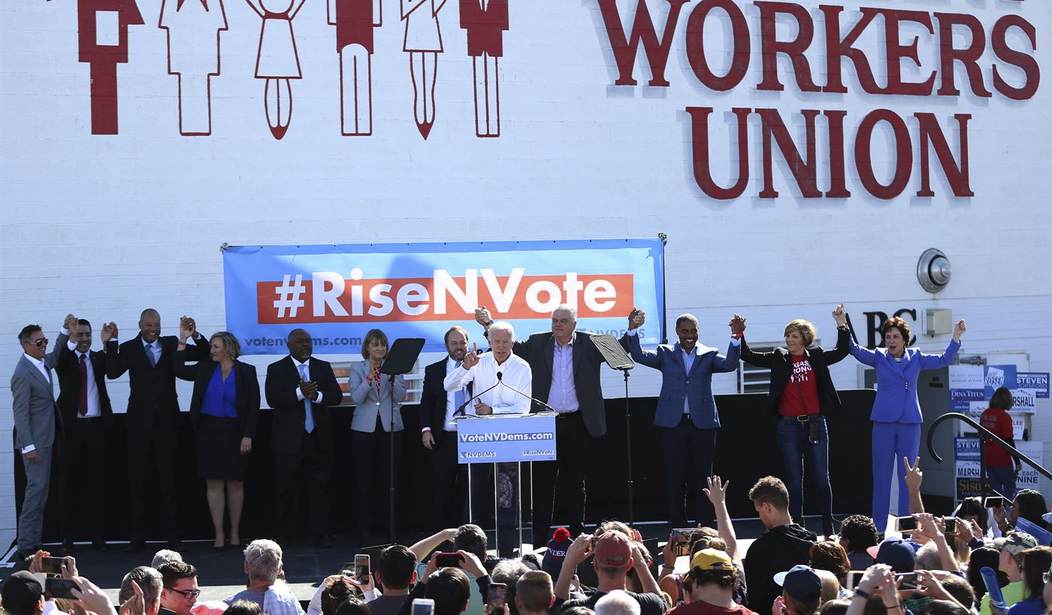The far-left socialist wing of the Democratic Party just scored a significant victory against the moderate establishment faction, and we can best believe they won’t stop there. In Nevada, socialist Democrats wrestled control over the state party from the moderate establishment, which triggered a mass exodus of employees who tendered their resignations.
Judith Whitmer, who is aligned with the Democratic Socialists of America (DSA), became the new chair of the Nevada Democratic Party along with a number of other individuals who were elected to key leadership positions. The Intercept reported:
On March 6, a coalition of progressive candidates backed by the local chapter of the Democratic Socialists of America took over the leadership of the Nevada Democratic Party, sweeping all five party leadership positions in a contested election that evening. Whitmer, who had been chair of the Clark County Democratic Party, was elected chair.
The individuals who quit after their establishment leadership was ousted intimated that Whitmer was going to fire them when she took over anyway, so they decided to resign. Whitmer denies the allegation. She told The Intercept, “What they just didn’t expect is that we got better and better at organizing and out-organizing them at every turn.”
But this seemingly sudden change in the state party’s leadership wasn’t all that sudden in reality. The battle between the far-left and establishment moderate factions began in 2016 with Sen. Bernie Sanders (I-VT) fighting Hillary Clinton for the presidential nomination. After Clinton defeated Sanders, the socialist crowd used the momentum from the campaign to begin gaining more power.
From The Intercept:
Over the next four years, outside organizations like DSA exploded in size and strength. The Sanders campaign focused on organizing tens of thousands of young Latino voters in the state, with the goal of activating people whom the party hadn’t bothered with before. And it worked: In the 2020 cycle, after investing heavily in Nevada, Sanders won a commanding victory in the Nevada caucuses.
After Sanders’ 2020 campaign ended, “the organizers behind it were ready to take their project to the next level,” according to The Intercept. They used the state-level delegates they got during the caucuses to “continue activating progressive pockets in the state with a focus on local office. The progressive crowd, which was supported by a slew of far-leftist organizations, won a majority on the state Democratic board last summer, which made it apparent that they would continue to grow in strength.
“This was certainly kind of immediately made possible by the caucus outcome,” Keenan Korth, a member of the state party’s central committee and a Whitmer supporter, told The Intercept. “But it really started before then, in that the caucus results were in and of themselves the result of a sustained organizing effort, and the slow accumulation of organizing infrastructure here post-2016, in large part through the campaign in 2018 for Amy Vilela.”
Vilela was a Congressional candidate in 2018 and later served as Sanders Nevada campaign co-chair.
After the mass departures of party staff, both factions accused each other of failing to promote unity in the ranks. The establishment figures claim Whitmer did not do enough to build bridges with the moderates. Her predecessor, former Clark County Democratic Chair Donna West, claimed Whitmer “does not listen to others’ opinions and really take those on board.”
As can be expected, Whitmer denies claims that she was not interested in unity. When discussing the mass resignations, she said, “what hit us by surprise and was sort of shocking is that for a slate that claimed that they were all about unity, and kept this false narrative of division going on throughout the entire campaign – in fact, they kept intensifying that – that’s what was surprising about it, was the willingness to just walk away instead of working with us.”
Whitmer’s predecessor, former Clark County Democratic Chair Donna West, said Whitmer did not try to bridge gaps within the party. She “does not listen to others’ opinions and really take those on board,” West said. “I found that working with her could be really difficult, that she doesn’t really collaborate well, and doesn’t work to build consensus.” West resigned last summer.
The civil war between the socialist and moderate factions of the Democratic Party is in full swing, and if this story is any indication, the far-left is willing to play the long game and focus on dominating politics at the state level. Some have already indicated that DSA-backed groups nationwide intend to use similar strategies to take over state and local Democratic offices.
What the @DemSocialists did to the Nevada Democratic Party, we’re going to do the same here in Florida.
— Jen Perelman (@JENFL23) March 9, 2021
Of course, it is worth noting that this does not mean the establishment faction will not, or is not, fighting back, so a socialist takeover is not at all guaranteed. Still, this is a development from which conservatives can learn.
The civil war on the Republican side is also in effect, which rank-and-file grassroots are clashing with the GOP elite establishment. Former President Donald Trump has now positioned himself on the front lines against the Romney/McConnell/Cheney factions. But for the non-establishment populist movement, it might be instructive to take a look at how the DSA apparatus works.
It will not be enough to simply oust a few establishment congressional politicians. Indeed, if everyday conservatives want to ensure the Republican Party keeps its promises to its voters, the anti-establishment must stage a long-term takeover. One of the mistakes that the GOP elite makes is in its tendency to focus only on the short-term. Perhaps it is time for the actual conservatives in the party to make their move.













Join the conversation as a VIP Member